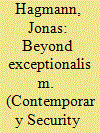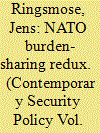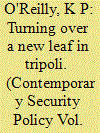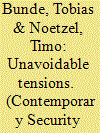|
|
|
Sort Order |
|
|
|
Items / Page
|
|
|
|
|
|
|
| Srl | Item |
| 1 |
ID:
098389


|
|
|
|
|
| Publication |
2010.
|
| Summary/Abstract |
Switzerland's traditional, military-centred and isolationist Cold War policies began to be vehemently contested in the 1990s. However, since the early 2000s, debates on security policy and foreign affairs have gradually lost public salience, and recent popular votes suggest increasingly consistent support both for a broader conception of national security and a more internationalist interpretation of neutrality. Have Switzerland's traditional policy frameworks thus been overcome? Investigating elite positions, this article argues that indeed, conventional disputes between military and civilian understandings of security have been transcended recently, as Swiss policy-makers settled for a remarkably broad and non-traditional conception of national security. At the same time, the article also argues, the perception of increasingly global security challenges has started to provide powerful rationales against traditional Swiss isolationism. By showing the processes through which Swiss security conceptions have been reformulated into a new dominant elite agreement, the article points out how Switzerland has slowly come to embrace security in European terms - not least also thanks to its new focus on non-traditional security agendas.
|
|
|
|
|
|
|
|
|
|
|
|
|
|
|
|
| 2 |
ID:
098393


|
|
|
|
|
| Publication |
2010.
|
| Summary/Abstract |
The breakdown of order and the collapse of state institutions in fragile and failed states creates situations that may pose direct security threats for foreign actors. Whether and to what degree NATO should lead international efforts to address the dangers posed by failed states, typically far out-of-area, is a major debate for alliance purpose and strategy. While the alliance has focused its energy on aspects of the problem like counterterrorism and piracy, most action on fragile and failed states has been ad hoc, mainly military interventions and post-conflict reconstruction. The problem of dysfunctional states requires a broader rethinking for the international community and especially for NATO as it revaluates strategic goals. To more effectively provide security within the territorial boundaries of its member states the alliance needs to look at security beyond the Euro-Atlantic area. Shaping the political environment means an expanded NATO role in conflict prevention and in avoiding state failure before it occurs. It is argued here that this strategic perspective will not mean more interventions for NATO, but fewer. Moving away from intervening to stress prevention of state failure involves a change of focus: the development of capacities to anticipate problems and rebuild states, and to strengthen institutional capacities in states of strategic importance to the alliance.
|
|
|
|
|
|
|
|
|
|
|
|
|
|
|
|
| 3 |
ID:
098392


|
|
|
|
|
| Publication |
2010.
|
| Summary/Abstract |
Since the end of the Cold War, the debates about NATO burden-sharing have changed considerably, yet descriptions of the basic burden-sharing dynamics have changed little since the Cold War era. This article shows that burden-sharing disputes remain a basic alliance problem, but they have changed fundamentally since 1989. The most salient burden-sharing disputes are worse today, illustrated most profoundly by experiences in Afghanistan. This article contrasts the major disparities between in alliance contributions during the Cold War and today. Working within the framework of collective goods theory, the article shows that NATO's ability to project military power is best accounted for by traditional security functions that the alliance still serves. Because of disputes and uncertainty over its strategic roles, and the tendency for many members to still perceive it as a vehicle for 'keeping the Russians out, the Germans down, and the Americans in', collective action problems related to out-of-area operations remain serious, but can be assuaged through careful management.
|
|
|
|
|
|
|
|
|
|
|
|
|
|
|
|
| 4 |
ID:
098388


|
|
|
|
|
| Publication |
2010.
|
| Summary/Abstract |
Despite its accomplishments, development of ESDP requires more than the leadership of France, Germany, and the United Kingdom. This is especially significant for overcoming divergence between 'old' and 'new' member states. As a vocal, medium-sized country, the largest of the new EU members, Poland, has special potential to influence ESDP. This article analyses continuity and change in Poland's security and defence views. It highlights beliefs, attitudes and norms shaping policy-makers' conceptions towards defence issues, stressing role theory. Poland initially reacted sceptically to the creation of ESDP, but its policies changed after 1) transformation of the international situation following 11 September, 2) international expectations of Poland to enhance its military role, and 3) Poland's desire to be a reliable European and transatlantic ally. This is despite the fact that Polish threat perceptions and immediate defence concerns are focused on its own neighbourhood, not the larger region or out of region. Polish acceptance of ESDP highlights the beginnings of a European strategic culture can be seen, despite divergences with other members, particularly over Russia. Poland's original scepticism has not just been replaced by pragmatism but also activism and potential leadership. Poland's positive approach offers a model for other member states to increase their contributions, turning ESDP into more than a German, French, and British exercise.
|
|
|
|
|
|
|
|
|
|
|
|
|
|
|
|
| 5 |
ID:
098390


|
|
|
|
|
| Publication |
2010.
|
| Summary/Abstract |
Over the past decade, Libya's international reputation has undergone a remarkable transformation. Previously a rogue state, Libya has been welcomed back into the international community after renouncing international terrorism and its weapons of mass destruction programs. Was this the result of a straightforward calculation of self-interests given the realities of the international system or some shift in Libyan leader Mu'ammar Qaddafi's world view? To assess this transformation, operational code analysis is utilized to systematically identify Qaddafi's world view and determine whether he underwent experiential learning, attributable to fundamental transformation of his world view, or a simple adaptation to the surrounding international environment. The findings indicate that while experiencing a modest degree of learning over time, Qaddafi did not undergo a significant transformation, but rather adapted to the international system around him. The analysis here supports viewing Libya's transformation cautiously, as perhaps a limited, temporary, and pragmatic move. For foreign actors trying to deal with seemingly other unpredictable leaders, the Libyan experience suggests that decision-making should be based on greater knowledge about the motives of individual leaders and their responsiveness to specific initiatives.
|
|
|
|
|
|
|
|
|
|
|
|
|
|
|
|
| 6 |
ID:
098391


|
|
|
|
|
| Publication |
2010.
|
| Summary/Abstract |
The article puts the contemporary debate on NATO 'going global' into its historical and conceptual perspective. Pressure to expand alliance responsibilities is not new, rather it is a fundamental problem of alliance goal setting and legitimacy. The pedigree of concepts like Global NATO can be traced back to earlier attempts at liberal order-building, efforts that have oscillated between universal and exclusive varieties. Recent proposals for the globalization of NATO or the creation of a global organization of democracies may best be understood as an institutional culmination of the liberal critique of universal multilateralism. While going global, taking on ever greater roles and responsibilities, is inconceivable to many alliance members, the liberal tradition makes expansion of alliance roles increasingly hard to resist. Contrary to prevailing continental European wisdom, the article concludes that the existence of a robust reformist tier within NATO as well as major strategic trends will keep the vision of a Global NATO on the agenda of Western security policy. It argues that exploring NATO's contested global question is crucial for the development and definition of the emerging role of the alliance and collective security.
|
|
|
|
|
|
|
|
|
|
|
|
|
|
|
|
| 7 |
ID:
098387


|
|
|
|
|
| Publication |
2010.
|
| Summary/Abstract |
Despite the presence of a new American Commander in Chief in Barack Obama in 2009, the use of military force abroad remains a staple of American foreign policy. This article examines the constitutional war powers political environment of the Obama presidency, which seeks to explain how the Obama administration perceives its constitutional authority to use force abroad. The article examines President Obama's and Vice President Joseph Biden's previous views on war powers while they served in the United States Senate, and in addition assesses two cases of President Obama's military actions, including examinations of Obama's military policymaking on Afghanistan and Obama's decision to authorize the US Navy Seals' use of force against Somali pirates in 2009. The findings suggest that despite having substantial records in the US Senate of supporting meaningful consultation between the Congress and the President prior to new military action, the Obama administration has acted much like previous Commanders in Chief, who made little effort to consult with Congress. In addition, in contrast to some current war powers scholarship, congressional Democrats have proven most likely to challenge the commander in chief, as most members of Congress have deferred to Obama's leadership. These findings indicate that Congress is unlikely to serve as a significant institutional check on President Obama as commander in chief, and that much like the Bush presidency, the centre of American military policymaking will remain at the White House and not the American Congress.
|
|
|
|
|
|
|
|
|
|
|
|
|
|
|
|
|
|
|
|
|